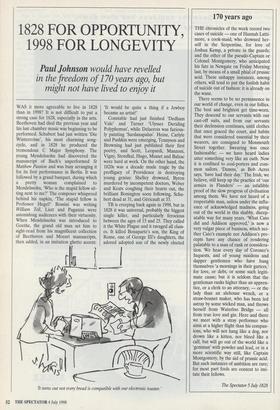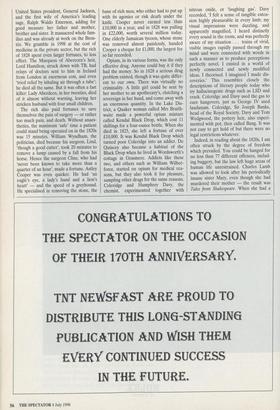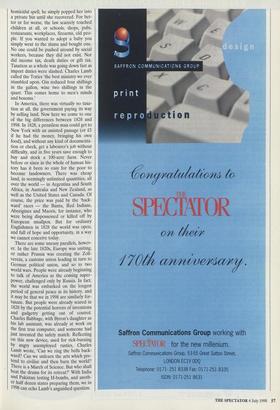1828 FOR OPPORTUNITY, 1998 FOR LONGEVITY
Paul Johnson would have revelled
in the freedom of 170 years ago, but might not have lived to enjoy it
WAS it more agreeable to live in 1828 than in 1998? It is not difficult to put a strong case for 1828, especially in the arts. Beethoven had died the previous year and his last chamber music was beginning to be performed. Schubert had just written 'Die Winterreisse', his most charming song- cycle, and in 1828 he produced the tremendous C Major Symphony. The young Mendelssohn had discovered the manuscript of Bach's unperformed St Matthew Passion and was busy arranging it for its first performance in Berlin. It was followed by a grand banquet, during which a pretty woman complained to Mendelssohn, 'Who is the stupid fellow sit- ting next to me?' The composer whispered behind his napkin, `The stupid fellow is Professor Hegel!' Rossini was writing William Tell, Liszt and Paganini were astonishing audiences with their virtuosity. When Mendelssohn was introduced to Goethe, the grand old man set him to sight-read from his magnificent collection of Beethoven and Mozart manuscripts, then added, in an imitation ghetto accent:
'It would be quite a thing if a Jewboy became an artist!'
Constable had just finished 'Dedham Vale' and Turner 'Ulysses Deriding Polyphemus', while Delacroix was furious- ly painting `Sardanapalus'. Heine, Carlyle and Pushkin were emerging, Tennyson and Browning had just published their first poetry, and Scott, Leopardi, Manzoni, Vigny, Stendhal, Hugo, Musset and Balzac were hard at work. On the other hand, the 1820s was a decade made tragic by the profligacy of Providence in destroying young genius: Shelley drowned, Byron murdered by incompetent doctors, Weber and Keats coughing their hearts out, the brilliant Bonington soon following, Schu- bert dead at 31, and Gericault at 33.
TB is creeping back again in 1998, but in 1828 it was universal, probably the biggest single killer, and particularly ferocious between the ages of 15 and 25. They called it the White Plague and it ravaged all class- es. It killed Bonaparte's son, the King of Rome, one of George III's daughters, the adored adopted son of the newly elected `It turns out not every bread is compatible with our electronic toaster.' United States president, General Jackson, and the first wife of America's leading sage, Ralph Waldo Emerson, adding for good measure her father and mother, brother and sister. It massacred whole fam- ilies and was already at work on the Bron- tës. We grumble in 1998 at the cost of medicine in the private sector, but the rich of 1828 spent even larger fortunes, to less effect. The Marquess of Abercorn's heir, Lord Hamilton, struck down with TB, had relays of doctors sent to him in Ireland from London at enormous cost, and even `tried relief by inhaling air through a tube'; he died all the same. But it was often a fast killer: Lady Aberdeen, in her twenties, died of it almost without warning, leaving her stricken husband with four small children.
The rich also paid fortunes to save themselves the pain of surgery — or rather too much pain, and death. Without anaes- thetics, the maximum 'safe' time a patient could stand being operated on in the 1820s was 15 minutes. William Wyndham, the politician, died because his surgeon, Lind, `though a good cutter', took 20 minutes to remove a lump caused by a fall from his horse. Hence the surgeon Cline, who had `never been known to take more than a quarter of an hour', made a fortune. Astley Cooper was even quicker. He had 'an eagle's eye, a lady's hand and a lion's heart' — and the speed of a greyhound. He specialised in removing the stone, the bane of rich men, who either had to put up with its agonies or risk death under the knife. Cooper never earned less than £10,000 in a year, and in 1828 was pulling in £22,000, worth several million today. One elderly Jamaican tycoon, whose stone was removed almost painlessly, handed Cooper a cheque for £1,000, the largest fee so far recorded.
Opium, in its various forms, was the only effective drug. Anyone could buy it if they had the money. So in 1828 a serious drug problem existed, though it was quite differ- ent to our own. There was virtually no criminality. A little girl could be sent by her mother to an apothecary's, clutching a sovereign in her hand, and come away with an enormous quantity. In the Lake Dis- trict, a Quaker woman called Mrs Braith- waite made a powerful opium mixture called Kendal Black Drop, which cost 11 shillings for a four-ounce bottle. When she died in 1825, she left a fortune of over £10,000. It was Kendal Black Drop which turned poor Coleridge into an addict. De Quincey also became a habitué of the Black Drop when he lived in Wordsworth's cottage in Grasmere. Addicts like these two, and others such as William Wilber- force, started on opium for medical rea- sons, but they also took it for pleasure, sampling other drugs for the same reasons. Coleridge and Humphrey Davy, the chemist, experimented together with nitrous oxide, or 'laughing gas'. Davy recorded, 'I felt a sense of tangible exten- sion highly pleasurable in every limb; my visual impressions were dazzling, and apparently magnified, I heard distinctly every sound in the room, and was perfectly aware of my situation . . . trains of vivid, visible images rapidly passed through my mind and were connected with words in such a manner as to produce perceptions perfectly novel. I existed in a world of newly connected and newly modified ideas. I theorised. I imagined I made dis- coveries.' This resembles closely the descriptions of literary people today who try hallucinogenic drugs such as LSD and crack. Coleridge and Davy used the gas to cure hangovers, just as George IV used laudanum. Coleridge, Sir Joseph Banks, head of the Royal Society, Davy and Tom Wedgwood, the pottery heir, also experi- mented with pot, then called Bang. It was not easy to get hold of but there were no legal restrictions whatever.
Indeed, in reading about the 1820s, I am often struck by the degree of freedom which prevailed. You could be hanged for no less than 77 different offences, includ- ing buggery, but the law left huge areas of human life unrestrained. Charles Lamb was allowed to look after his periodically insane sister Mary, even though she had murdered their mother — the result was Tales from Shakespeare. When she had a homicidal spell, he simply popped her into a private bin until she recovered. For bet- ter or for worse, the law scarcely touched children at all, or schools, shops, pubs, restaurants, workplaces, firearms, old peo- ple. If you wanted to adopt a baby you simply went to the slums and bought one. No one could be pushed around by social workers, because they did not exist. Nor did income tax, death duties or gift tax. Taxation as a whole was going down fast as import duties were slashed. Charles Lamb called the Tories 'the best ministry we ever stumbled upon. Gin reduced four shillings in the gallon, wine two shillings in the quart. This comes home to men's minds and bosoms.'
In America, there was virtually no taxa- tion at all, the government paying its way by selling land. Now here we come to one of the big differences between 1828 and 1998. In 1828, a penniless man could get to New York with an assisted passage (or £5 if he had the money, bringing his own food), and without any kind of documenta- tion or check, get a labourer's job without difficulty, and in five years save enough to buy and stock a 100-acre farm. Never before or since in the whole of human his- tory has it been so easy for the poor to become landowners. There was cheap land, in seemingly unlimited quantities, all over the world — in Argentina and South Africa, in Australia and New Zealand, as well as the United States and Canada. Of course, the price was paid by the 'back- ward' races — the Bantu, Red Indians, Aborigines and Maoris, for instance, who were being dispossessed or killed off by European smallpox. But for ordinary Englishmen in 1828 the world was open, and full of hope and opportunity, in a way we cannot conceive today.
There are some uneasy parallels, howev- er. In the late 1820s, Europe was uniting, or rather Prussia was creating the Zoll- verein, a customs union leading in turn to German political union, and so to two world wars. People were already beginning to talk of America as the coming super- power, challenged only by Russia. In fact, the world was embarked on the longest period of general peace in its history, and it may be that we in 1998 are similarly for- tunate. But people were already scared in 1828 by the potential horrors of inventions and gadgetry getting out of control. Charles Babbage, with Byron's daughter as his lab assistant, was already at work on the first true computer, and someone had just invented the safety match. Reflecting on this new device, used for rick-burning by angry unemployed rustics, Charles Lamb wrote, 'Can we ring the bells back- ward? Can we unlearn the arts which pre- tend to civilise and then burn the world? There is a March of Science. But who shall beat the drums for its retreat?' With India and Pakistan testing H-bombs, and anoth- er half dozen states preparing them, we in 1998 can echo Lamb's anguished question.
















































































































 Previous page
Previous page